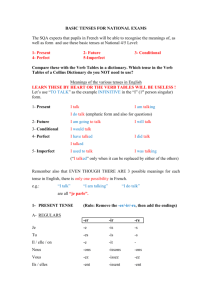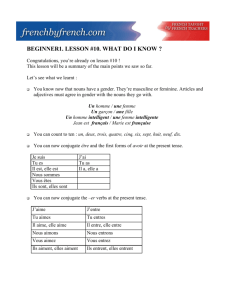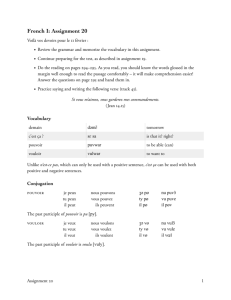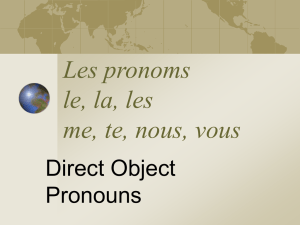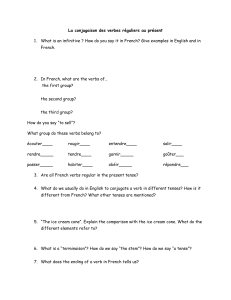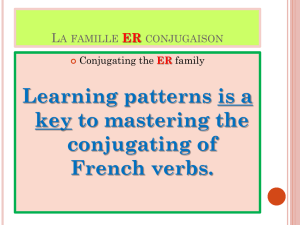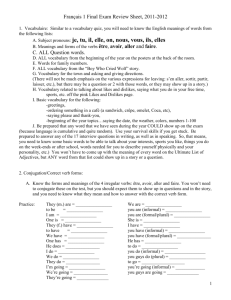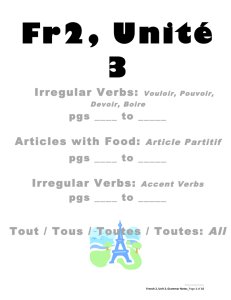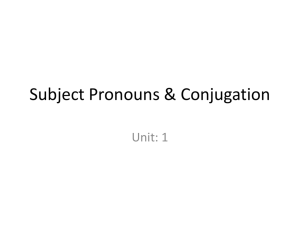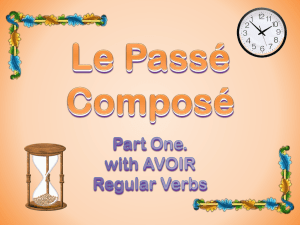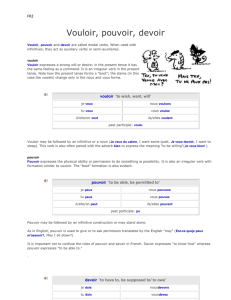French 2, Unit 3: Grammar Packet
advertisement
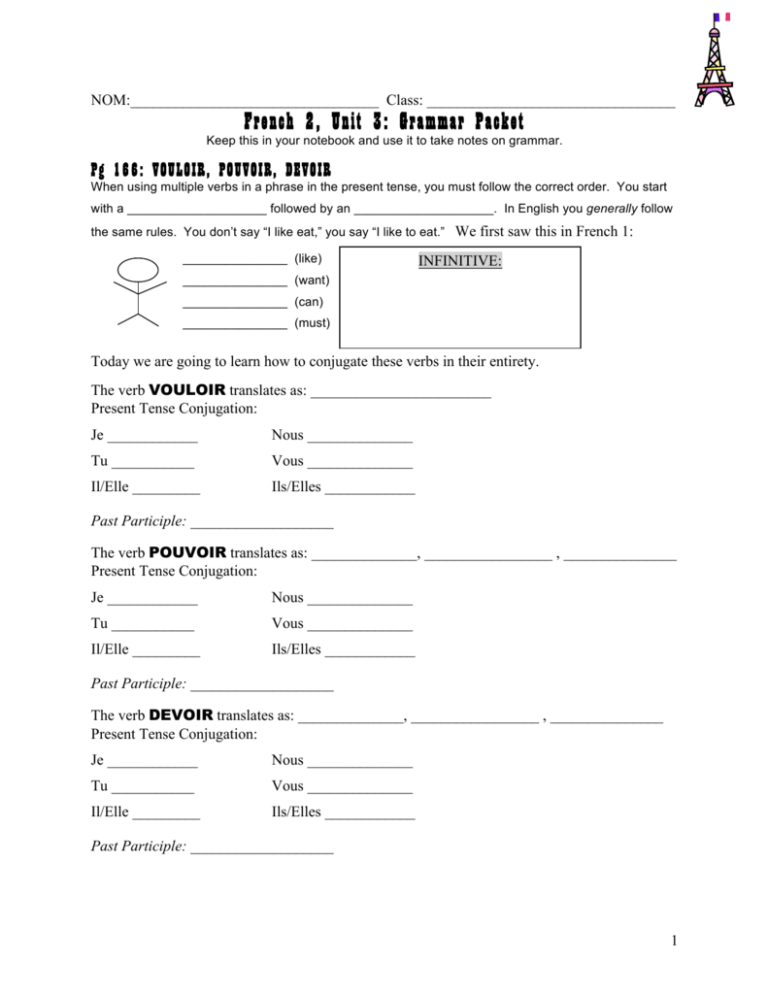
NOM:_________________________________ Class: _________________________________ French 2, Unit 3: Grammar Packet Keep this in your notebook and use it to take notes on grammar. Pg 166: VOULOIR, POUVOIR, DEVOIR When using multiple verbs in a phrase in the present tense, you must follow the correct order. You start with a ____________________ followed by an ____________________. In English you generally follow the same rules. You don’t say “I like eat,” you say “I like to eat.” _______________ (like) We first saw this in French 1: INFINITIVE: _______________ (want) _______________ (can) _______________ (must) Today we are going to learn how to conjugate these verbs in their entirety. The verb VOULOIR translates as: ________________________ Present Tense Conjugation: Je ____________ Nous ______________ Tu ___________ Vous ______________ Il/Elle _________ Ils/Elles ____________ Past Participle: ___________________ The verb POUVOIR translates as: ______________, _________________ , _______________ Present Tense Conjugation: Je ____________ Nous ______________ Tu ___________ Vous ______________ Il/Elle _________ Ils/Elles ____________ Past Participle: ___________________ The verb DEVOIR translates as: ______________, _________________ , _______________ Present Tense Conjugation: Je ____________ Nous ______________ Tu ___________ Vous ______________ Il/Elle _________ Ils/Elles ____________ Past Participle: ___________________ 1 Sentences with VOULOIR, POUVOIR, DEVOIR I want to sing! Je _____________________________ (vouloir chanter) I can dance. ! Je ________________________________ (pouvoir danser) I have to study. ! J ____________________________________(devoir étudier) She would like to eat. ! _elle _______________________________(vouloir manger) *He wanted a pizza. ! Il ____________________________________(vouloir une pizza) Do you want to go jogging? !ESt-ce que _________________________(faire du shopping) He can’t eat with us. ! Il _________________________________avec nous (pouvoir manger) We have to dance tonight !Nous ________________________ ce soir (devoir danser) ******Exceptions****** If DEVOIR is followed by a ______________ then it translates as ___________. I owe 5 euros to my brother. ! Je __________________ 5 euros à mon frère She owes 20 euros. ! ________________________________________________ The polite form of VOULOIR is ______________ it translates as I_______________ . I would like a sandwich. ! _____________________________________________ I would like to leave. ! ________________________________________________ Pg 168:L’article partitif: du, de la In ENGLISH when talking about food, we don’t always say how much of something we want. I want chicken. I would like some chicken. I ate a chicken. I want cake. I’m eating cake. I ate some cake. When the French talk about food items they ALWAYS _____________ how much of the food they want. Instead they usually refer to part of the item and say ______________. These are the phrases you use to say SOME: Math Formula: ________ (masc) de + le = ______ ________ (feminine) ________ (vowel) 2 ________ (plural) de + les= _______ Sometimes it is necessary to describe a __________________ item such as A melon, A cake or A chicken. To describe a WHOLE item you use the INDEFINITE ARTICLES _____ and ____. Sometimes you want to say that you like something in ________________. If you want to say that you like something in _______________ you use the DEFINITE articles ____, ____, _____. Pg 178: Le choix des articles Now that we’ve learned how to use articles with food, let’s make a summary chart. du, de la, de l’, des un/une le, la, les Verb clues: Practice: I would like soup: je voudrais __________________________ soupe I’m eating bread:je mange _________________ pain We ate chicken:Nous mangeons _________________________ poulet I eat cereal in the morning: je mange ________________ céreales He wants some tea:Il veut __________________ thé I’m cooking a chicken: je cuis ______________poulet He likes tea: il aime _____________ thé I made a pie:J’ai fait _____________tarte She likes fish: _Elle aime ______________ poulet 3 Pg 170:L’article partitif in negative sentences In the ____________ pas is ALWAYS followed by __________. “PAS ______” Practice: I don’t want (any) soup:je ne veux pas _____________ soupe I’m not eating (any) bread: je ne mange pas ______________ pain We didn’t eat (any) chicken: nous ne mangeons pas _____________poulet He does not like tea: il n’aime pas ___________thé Understanding the PartItive Article vs Nom + de + nom (Possession) In French you never say “______________ pen”. You always say “the pen ________________. To form this, you use _________ or __________. This is different than the partative article because you do _________ change it to ____________ or __________. It’s always _____ or _____. EX: Sue’s family. ! La famille de Sue French class ! La classe de français. PRACTICE: Bob’s pen ! _____________________ Sarah’s computer ! _________________ Sports car ! _____________________ Jazz music. ! ______________________ Practice: Try a few sentences on your own ______________________________________________________________________________ ______________________________________________________________________________ Pg 176: BOIRE The verb BOIRE translates as: ________________________ Present Tense Conjugation: Je ____________ Nous ______________ Tu ___________ Vous ______________ Il/Elle _________ Ils/Elles ___________ Past Participle: _________ Examples: 4 I drink apple juice ! Je _________________ du jus de fruit He drinks water. ! Il _________________ de l’eau We drank soda. ! Nous _________________________du soda Did you drink the milk? ! Est-ce que vous _____________________ du lait Pg 177: ACHETER, PRÉFÉRER, PAYER (Accent) ACHETER and PRÉFÉRER are called _____________________ because when conjugating them they follow a ________________ in where you place the ________________. Although they seem small and unimportant, the _________________ are important because they affect how you _________________ these verbs in different forms. In order to know where you place the ______________ you need to know if there are _____________ in the infinitive form. In the NOUS and VOUS form, the stem returns back to the _____________ form. acheter: ________________ J’ _______________ nous _________________ tu _______________ vous (f/g)_____________ il/elle_____________ ils/elles_______________ amener: ________________ J’ _______________ nous _________________ tu _______________ vous (f/g)_____________ il/elle_____________ ils/elles_______________ préférer: ________________ Je _______________ nous _________________ tu _______________ vous (f/g)_____________ il/elle_____________ ils/elles_______________ 5 espérer: ________________ Je _______________ nous _________________ tu _______________ vous (f/g)_____________ il/elle_____________ ils/elles_______________ PAYER follows the same pattern, just not with accents. In the NOUS and VOUS form, the stem returns back to the _____________ form. payer: ________________ J’ _______________ nous _________________ tu _______________ vous (f/g)_____________ il/elle_____________ ils/elles_______________ envoyer: ________________ Je _______________ nous _________________ tu _______________ vous (f/g)_____________ il/elle_____________ ils/elles_______________ nettoyer: ________________ Je _______________ nous _________________ tu _______________ vous (f/g)_____________ il/elle_____________ ils/elles_______________ PRACTICE: I’m buying a cake.! J’ ________________________ un gâteau He is buying an apple. ! Il _______________________une pomme Are you going to buy the car?!ESt-ce que tu __________________ une voiture We are bringing Pierre. ! Nous _____________________ Pierre Are they paying for eggs? ! ES-ce qu’il _______________ pour les oeufs 6 Pg 190: L’adjectif tout Tout translates in English as _____________ and ________________. However, since it is an _________________ it must agree in _________________ and __________________. Here is the pattern it follows: Masculine Feminine _______________ ________________ _______________ ________________ Tout can be used in several common expressions: Everyone/Everybody: __________________________ All the time: __________________________________ Everything: __________________________________ Examples: I drink everything ! Je_______________________ (tout boire) I drank everything! j’________________________(tout boire) He bought all the shoes. !il _________________________________les chaussures We have all the books. ! Nous_____________________________________(les livres) Did you drink all the milk? ! As-tu _________________________________(le lait) Do you all work all the time? ! Est-ce que _______________________________(le temps) Pg 191: L’expression Il faut + infinitive In French, the impersonal expression ____________________ is often used to describe obligation. It’s similar to the verb _________________, but it is a general expression instead. Like _______________ Il faut is followed by an __________________. It can also be used after the expression Pour + _____________, il faut+_______________. Examples: One must eat salad. ! _______________________________________(manger de la salade) You have to sleep . ! _________________________________________(dormer) It is necessary to speak in French. !___________________________(parler francais) In order to win you must play. !Pour gagner ___________________________(jouer) To succeed you must work ! Pour réussir ______________________________(travailler) 7
